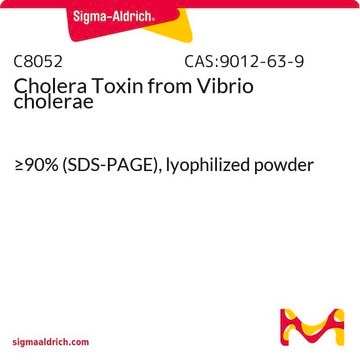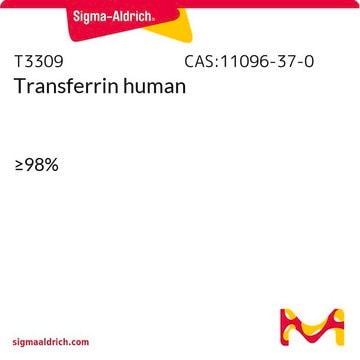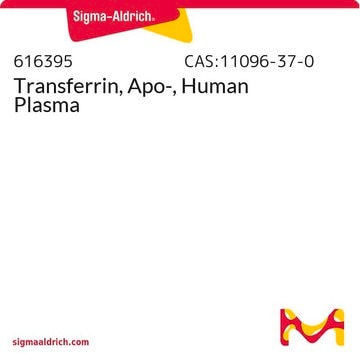T2252
apo-Transferrin human
≥95% protein basis (biuret)
Synonym(s):
Human transferrin, Siderophilin
Sign Into View Organizational & Contract Pricing
All Photos(4)
About This Item
Recommended Products
biological source
human
Assay
≥95% protein basis (biuret)
≥98% (agarose gel electrophoresis)
form
powder
mol wt
76-81 kDa
technique(s)
cell culture | mammalian: suitable
solubility
H2O: 50 mg/mL
UniProt accession no.
shipped in
wet ice
storage temp.
−20°C
Gene Information
human ... TF(7018)
Looking for similar products? Visit Product Comparison Guide
General description
Transferrin is a bilobed glycoprotein containing an N-terminal lobe and a C-terminal lobe. Each of these domains is divided into two sub-domains and within the inter subdomain cleft is the metal-binding site. A single transferrin molecule can bind to two ferric ions. Apo-transferrin is an iron-free form.
Application
Apo-transferrin has been shown to strongly inhibit bacterial adhesion to biomaterials including polystyrene, polymethylmethacrylate, and silicone. Inhibition was seen at twenty micrograms/ml in culture medium.
apo-Transferrin human has been used in Dulbecco′s Modified Eagle Medium/Nutrient Mixture F-12 to culture:
- pancreatic ductal adenocarcinoma (PDAC) cell lines
- oligodendrocytes
- renal proximal tubule epithelial cells (RPTEC/TERT1) cells
Biochem/physiol Actions
Transferrin transports iron through receptor-mediated endocytosis. The iron transport mechanism occurs in the endothelial cells of the blood-brain barrier. Transferrin maintains iron homeostasis and is an iron-associated marker. Reduced levels of transferrin are observed in severe COVID-19 conditions. It may bind to other molecules apart from iron, hence it can be used in targeted drug delivery.
Other Notes
Non-heme iron-transport protein.
Disclaimer
RESEARCH USE ONLY. This product is regulated in France when intended to be used for scientific purposes, including for import and export activities (Article L 1211-1 paragraph 2 of the Public Health Code). The purchaser (i.e. enduser) is required to obtain an import authorization from the France Ministry of Research referred in the Article L1245-5-1 II. of Public Health Code. By ordering this product, you are confirming that you have obtained the proper import authorization.
Storage Class Code
11 - Combustible Solids
WGK
WGK 3
Certificates of Analysis (COA)
Search for Certificates of Analysis (COA) by entering the products Lot/Batch Number. Lot and Batch Numbers can be found on a product’s label following the words ‘Lot’ or ‘Batch’.
Already Own This Product?
Find documentation for the products that you have recently purchased in the Document Library.
Customers Also Viewed
Reza Ardehali et al.
Artificial organs, 26(6), 512-520 (2002-06-20)
Apo-transferrin (apo-Tf), the iron deficient form of Tf, has been identified previously as a potent inhibitor of Staphylococcus epidermidis adhesion to polyurethane surfaces. In this study, the ability of apo-Tf to suppress the adhesion of two other strains of bacteria
Catherine Claise et al.
International journal of infectious diseases : IJID : official publication of the International Society for Infectious Diseases, 116, 74-79 (2021-12-25)
Mounting evidence links hyperinflammation in gravely ill patients to low serum iron levels and hyperferritinemia. However, little attention has been paid to other iron-associated markers such as transferrin. The aim of this study was to investigate the association of different
Camila Campos-Escamilla et al.
International journal of molecular sciences, 22(24) (2021-12-25)
Human serum transferrin (Tf) is a bilobed glycoprotein whose function is to transport iron through receptor-mediated endocytosis. The mechanism for iron release is pH-dependent and involves conformational changes in the protein, thus making it an attractive system for possible biomedical
Agostina Nardone et al.
Cell and tissue banking, 10(4), 301-308 (2009-02-03)
In breast cancer, various clinical parameters are assessed to define clinical stage and thus obtain a more accurate prognosis. However, banks of tumor tissues are an important source of material for studies of risk of recurrence and of features governing
Jacob M Smigiel et al.
Molecular cancer research : MCR, 15(4), 478-488 (2017-01-06)
Pancreatic ductal adenocarcinoma (PDAC) is referred to as a silent killer due to the lack of clear symptoms, a lack of early detection methods, and a high frequency of metastasis at diagnosis. In addition, pancreatic cancer is remarkably resistant to
Our team of scientists has experience in all areas of research including Life Science, Material Science, Chemical Synthesis, Chromatography, Analytical and many others.
Contact Technical Service













